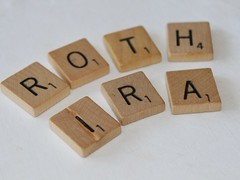Contemplating whether to contribute to a Roth IRA or a defined contribution (DC) plan (such as a 401k)? Words of advice: Follow the money! If your company offers you a match for your DC plan contribution, you should keep investing in the account up to the maximum percentage that it will match. This is free money, and you won't find a better deal any place else.
After you've maxed out the match, it's probably wise to invest any remaining cash in a Roth IRA. You can put in as much as $5,500 in 2013 ($6,500 if you are 50 years or older), as long as your income doesn't top certain levels. You won't get any tax deductions with the Roth, but you won't have to pay any taxes on it for the rest of your life, which can turn out to be an advantage over a DC plan. Another plus for the Roth is that you can keep your money there forever, as opposed to a plan like a 401(k), from which you have to start taking withdrawals by age 70 1/2.
With a Roth IRA, one big advantage is the ability to take certain early distributions without paying the early distribution penalty. If you withdraw assets from an employer plan before retirement, you'll pay a penalty and taxes (but many firms offer employees the option of taking loans from their accounts).
If you're fortunate enough to still have money to invest after you've maxed out on your Roth IRA, then by all means start putting it back into your DC plan. It's a good idea to have retirement money in different types of accounts, because you never know what the tax laws will be 30 years down the road. Please consult with a financial advisor or tax professional for the latest rules and regulations.

 248.335.7211
248.335.7211